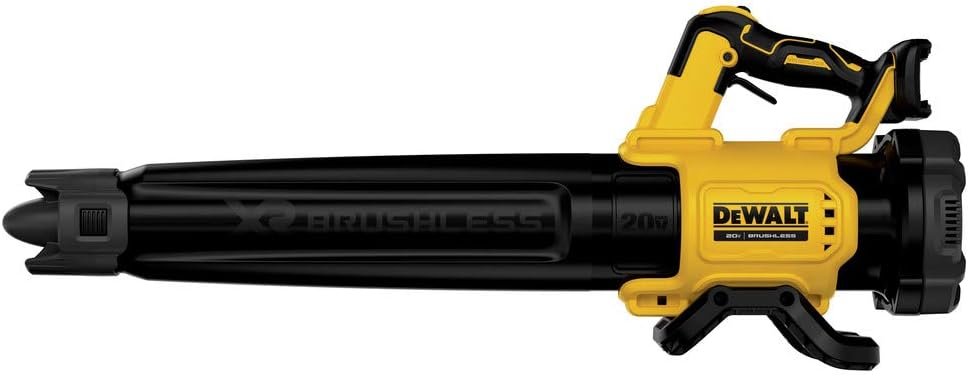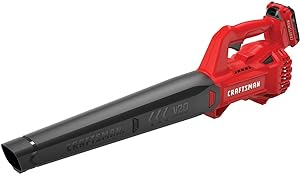
Battery-operated leaf blowers are the easiest to use.
Imagine a peaceful Saturday morning in your garden, the quiet only slightly disturbed by the soft whir of an electric leaf blower. This scenario is increasingly common as more homeowners turn to electric leaf blowers. Many prefer them because they seek silence. The quiet operation is much different from the noisy disruption of their gas-powered counterparts. Electric leaf blowers not only reduce noise pollution but also offer a host of other benefits and some limitations, especially when stacked up against gas leaf blowers.
In this blog post, we will explore the pros and cons of electric leaf blowers, focusing particularly on their quieter operation. While they excel in providing a more serene garden environment, questions about their power and battery life persist.
Join us as we explore whether an electric leaf blower is the right choice for your home and garden maintenance.
Pros of Electric Leaf Blowers
Here are some reasons that folks prefer electric, especially the cordless units with a battery pack:
Reduced Noise Pollution
- Quiet Operation: Electric leaf blowers operate at significantly lower decibel levels than gas models, making them neighborhood-friendly and ideal for use in noise-sensitive areas.
- Stress Reduction: The reduced noise level minimizes stress for the user and those nearby, creating a more pleasant environment for garden maintenance.
Environmental Impact
- Zero Emissions: Electric models do not emit harmful pollutants, contributing to cleaner air. I have asthma, so the odors from the gas leaf blower can sometimes trigger an attack.
- Energy Efficiency: They use less energy and can be powered by renewable energy sources, further reducing their environmental footprint.
User-Friendly Design
- Lightweight and Maneuverable: Electric leaf blowers are generally lighter and easier to handle. Therefore, they are easier to operate for a wider range of users.
- Ease of Use: They start with the push of a button, eliminating the need for fuel mixing or engine priming required in gas models.
Cost-Effectiveness
- Lower Operating Costs: Electric leaf blowers have fewer running costs as they do not require gas or oil.
- Minimal Maintenance: They typically require less maintenance than gas-powered alternatives, saving time and money in the long run.
Safety and Health Benefits
- Reduced Fumes: Operating without gasoline, electric leaf blowers eliminate the user’s exposure to harmful fumes.
- Decreased Vibration: They often produce less vibration, reducing the risk of hand-arm vibration syndrome, a common issue with gas-powered tools.
Versatility
- Indoor and Outdoor Use: The absence of fumes and lower noise levels make electric leaf blowers suitable for both indoor and outdoor spaces, like garages or sheds.
- Variable Speed Settings: Many models offer adjustable speed settings, providing more control for different tasks.

Up to 450 CFM of air volume and up to 125 Mph with concentrator
Innovative axial fan design that maximizes on air output and run time
Low noise during operation – 66 dB(A), ideal for noise sensitive regions and properties
High-efficiency brushless motor helps extend run time and motor life
Lightweight and ergonomic design allows for easy control and arm movement
Cons of Electric Leaf Blowers
Next, let’s take a look at the drawbacks of electric leaf blowers, which are significant:
Power and Efficiency
- Lower Power Output: Electric leaf blowers often have less power than gas models. Thus, it might affect their ability to handle heavy debris and large areas.
- Struggle with Tougher Tasks: They may not perform as effectively with wet leaves or dense, matted debris. As a result, you may expend more time and effort for certain jobs.
Operational Time and Range
- Limited Battery Life: For cordless models, the battery life can restrict the duration of use. In turn, you will need frequent recharging or spare batteries for larger tasks.
- Restricted Mobility with Corded Models: Corded electric leaf blowers limit the user’s range of movement and are less practical for larger properties or areas without easy access to power outlets.
Battery Life and Replacement Costs
- Battery Longevity Issues: Over time, the batteries may lose their efficiency, leading to reduced performance and the need for replacements.
- Additional Expense: Purchasing new batteries or multiple batteries for extended use can add to the overall cost of ownership.
Weather Limitations
- Reduced Effectiveness in Wet Conditions: Electric models might not be as powerful or safe to use in damp or wet conditions, limiting their utility.
- Safety Concerns: Using electric leaf blowers in wet environments poses a risk of electrical hazards, requiring extra caution.
Limited Variety and Features
- Fewer Options Available: A narrower range of models and features is available in electric leaf blowers than gas models.
- Lack of Advanced Features: Some may lack advanced features like vacuum and mulching capabilities that are often found in gas models.
Dependency on Electricity
- Need for Power Source: Their operation relies on being near an electrical outlet or having a charged battery, which can be limiting.
- Not Ideal for Remote or Off-Grid Use: Electric leaf blowers are impractical in areas without easy access to electricity.
Comparative Analysis of Electric vs. Gas Leaf Blowers

DEPENDABLE PERFORMANCE: V20* MAX 2.0Ah lithium ion battery provides reliable power and performance
MAXIMIZE YOUR CLEANING POWER: Delivers air volume to 200 CFM and 90 MPH
REMOVE STUBBORN DEBRIS with integrated nozzle scraper
LIGHTWEIGHT AND COMPACT: Designed for easy maneuvering in hard-to-reach spaces
Power and Performance
- Gas-Powered Advantages: Gas leaf blowers are typically more powerful, making them suitable for heavy-duty tasks and large areas.
- Electric Models’ Limitations: Electric leaf blowers, while improving, still generally lag behind in power and may struggle with challenging tasks like wet leaves or thick debris.
Environmental and Health Impact
- Electric Models’ Benefits: They excel in eco-friendliness with zero emissions and significantly lower noise levels. Thus, they may offer a healthier option for both the user and the environment.
- Gas-Powered Drawbacks: Gas models contribute to air pollution and noise pollution, and expose users to harmful fumes.
Ease of Use and Maintenance
- Electric Convenience: Electric leaf blowers are lighter, start instantly, and require less maintenance, making them more user-friendly, especially for casual or less frequent users.
- Gas-Powered Maintenance: Gas models often require more complex maintenance, including fuel mixing and engine servicing.
Cost Considerations
- Initial and Running Costs: Electric leaf blowers generally have lower operating costs but can have higher initial costs, especially for models with long-lasting batteries.
- Gas Models’ Ongoing Expenses: Gas blowers often have lower initial costs but incur ongoing expenses for fuel and maintenance.
Flexibility and Range
- Electric Models’ Restrictions: Corded electric blowers limit range. Plus, battery-powered models are constrained by battery life.
- Gas-Powered Mobility: Gas blowers offer greater mobility and uninterrupted use. They are more beneficial for large properties or commercial use.
Suitability for Different Environments
- Electric Models in Urban Settings: Ideal for residential and urban areas due to their quiet operation and lack of emissions.
- Gas Models in Rural or Commercial Settings: Better suited for rural or commercial settings where power and uninterrupted operation are prioritized.
Technological Advancements and Trends
- Evolving Electric Technology: Advancements in battery technology and motor efficiency are gradually narrowing the performance gap.
- Gas Models’ Steady Performance: Gas blowers maintain their advantage in power and range but face increased environmental scrutiny.
Who Should Consider an Electric Leaf Blower?
Homeowners with Small to Medium-Sized Yards
- Ideal for Limited Spaces: Electric leaf blowers are perfect for smaller yards where the reduced power is sufficient and the limited range is not an issue.
- Ease of Storage: Their compact size makes them easier to store in limited spaces.
Environmentally Conscious Consumers
- Eco-Friendly Choice: Those who prioritize environmental sustainability will appreciate the zero emissions and energy efficiency of electric models.
- Reduced Noise Pollution: Ideal for users who are conscious of their impact on neighborhood noise levels.
Users with Noise Restrictions
- Compliance with Local Regulations: In areas with strict noise regulations, the quieter operation of electric leaf blowers makes them a compliant choice.
- Community-Friendly Option: They are suitable for use in community spaces like shared gardens or residential complexes.
Elderly or Physically Limited Individuals
- Lightweight and Easy to Handle: The lighter weight and simpler operation of electric leaf blowers make them more accessible for older or physically limited users.
- Reduced Vibration: Lower vibration levels are less taxing on the body, making them a more comfortable choice.
Casual or Less Frequent Users
- Convenience for Occasional Use: The ease of starting and maintaining electric leaf blowers makes them ideal for users who only need them occasionally.
- No Need for Fuel Management: The absence of fuel-related requirements is a plus for those who use leaf blowers infrequently.
Indoor and Specialized Usage
- Suitable for Indoor Environments: The lack of fumes and lower noise levels make electric leaf blowers viable for indoor or enclosed spaces. For instance, someone can use it to blow away debris after a home project.
- Precision Tasks: Adjustable speed settings on many electric models allow for more control in tasks requiring precision.
Tips for Choosing an Electric Leaf Blower
Assessing Power Needs
- Understand Power Ratings: Look at the CFM (Cubic Feet per Minute) and MPH (Miles Per Hour) ratings to gauge the blower’s power.
- Match Power to Task: Consider the types of debris and size of the area you’ll be working with to ensure sufficient power.
Considering Battery Life and Performance
- Battery Capacity: Check the ampere-hour (Ah) rating for an estimate of battery longevity.
- Runtime Requirements: Consider how long you’ll typically need to use the blower in one session and select a model to accommodate that.
Weight and Ergonomics
- Comfortable Handling: Choose a comfortable model to hold and use, especially if you’ll use it for extended periods.
- Balance and Design: Look for a well-balanced design that reduces user fatigue.
Noise Level
- Check Decibel Ratings: Since one of the main advantages of electric models is quieter operation, ensure the noise level is acceptable for your environment.
- Community Guidelines: Be aware of any noise regulations in your community when selecting a blower.
Brand Reliability and Warranty
- Reputable Brands: Opt for brands with a good reputation for quality and customer service.
- Warranty Period: A longer warranty can indicate the manufacturer’s confidence in their product.
Look for Additional Features
- Speed Settings: Adjustable speeds can be useful for different tasks, from gentle sweeping to more powerful blowing.
- Mulching Capabilities: Some models offer mulching functions, which can be beneficial for garden maintenance.
Price and Value for Money
- Budget Consideration: Determine your budget and find the best model within that range.
- Long-Term Value: Consider the long-term costs of batteries and maintenance when evaluating the price.
Read Reviews and User Feedback
- Real-World Insights: Look for user reviews and feedback to get a sense of performance and reliability in everyday use.
- Comparative Analysis: Compare models based on user experiences, not just on paper specifications.
The Takeaway: Electric Leaf Blowers Are a Good Tool for Lighter, At-home Use
Electric leaf blowers offer a compelling combination of user-friendliness and quieter operation than gas leaf blowers. They represent a significant step forward in garden tool technology. Furthermore, they align with the growing trend towards more sustainable and community-friendly gardening practices.
What do I use? I have one of each. The battery-pack electric leaf blower is my go-to for its ease of starting and its light in weight. I have difficulty starting the gas leaf blower, and the electric one is easy. However, if I have wet, heavy leaves or a big job, I wrestle the gas leaf blower and somehow manage to start it.
My personal pick? The EGO Power+. I am only 5’3″ and need something that’s well-balanced. This blower gets the job done around my yard and has a battery that lasts longer than I need it to for simple jobs around my yard.
We invite our readers to share their experiences with electric leaf blowers or pose any questions in the comments section below. Your insights and inquiries can help enrich the discussion and assist others in making informed decisions about their garden maintenance tools. You can connect with us on MeWe and Facebook – please leave your comments.

